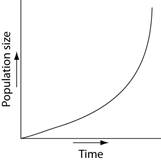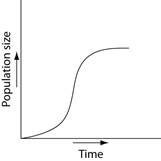BIO Chapter 23 Study Questions (Population Ecology)
1/61
There's no tags or description
Looks like no tags are added yet.
Name | Mastery | Learn | Test | Matching | Spaced |
|---|
No study sessions yet.
62 Terms
No population can grow indefinitely. The ultimate size of any population is limited by _____.
the carrying capacity of its environment
Which statement is true with regard to human population growth?
Its rate of growth is slowing.
What are three basic issues that life histories entail?
when reproduction begins, how often the organism breeds, and how many offspring are produced during each reproductive episode
Which of the following is the best example of uniform distribution?
territorial songbirds in a mature forest during mating season
To measure the population of lake trout in a 250-hectare lake, 400 individual trout were netted and marked with a fin clip, then returned to the lake. The next week, the lake was netted again, and out of the 200 lake trout that were caught, 50 had fin clips. Using the capture-recapture estimate, the lake trout population size could be closest to which of the following?
1,600
_______________ refers to any characteristic that is not affected by population density.
density independent
A newly mated queen ant founds a nest in an unoccupied patch of suitable habitat. Assuming that no disasters strike the nest, which of the following types of equations is likely to best describe the population growth of the new colony over the long term?
logistic
When needed resources are unevenly distributed, organisms often show _____ dispersion pattern.
a clumped
Starting from a single individual, what is the size of a population of bacteria that reproduce by binary fission every 20 minutes at the end of a 2-hour time period? (Assume unlimited resources and no mortality.)
64
To calculate the human population density of your community, you would need to know the number of people living there and _____.
the size of the area in which they live
In July 2008, the United States had a population of approximately 302,000,000 people. How many Americans were there in July 2009, if the estimated 2008 growth rate was 0.88%?
304,600,000
A wildlife biologist is trying to predict what will happen to a bear population if bear hunting is banned. He had the equations all worked out but then realized that he had grossly underestimated the amount of food available to the bears. To make his prediction more accurate he should _____ the value of _____ in his equation. (Consider food to be a factor that limits the size of the bear population.)
increase ... K
Which choice below is an example of an expression of population density?
the number of Paramecium caudatum in a 250-mL solution in a glass flask
__________ refers to the number of individuals per unit area or volume.
density
Kingfish, Louisiana, had a population of 1,100 individuals. They had a birth rate of 12/100, a death rate of 8/100, an emigration (individuals leaving the population) rate of 2/100 and an immigration rate of 0/100. How many people were added to Kingfish's population in one year?
22
Natural selection involves energetic trade-offs between
high survival rates of offspring and the cost of parental care.
Which of the following groups would be most likely to exhibit uniform dispersion?
red squirrels, who actively defend territories
______________ refers to any characteristic that varies with population density.
density dependent
Kingfish, Louisiana, had a population of 1,100 individuals. They had a birth rate of 12/100, a death rate of 8/100, an emigration (individuals leaving the population) rate of 2/100 and an immigration rate of 0/100. What was the per capita rate of increase, including emigration, for this year in Kingfish?
0.02
As N approaches K for a certain population, which of the following is predicted by the logistic equation?
The growth rate will approach zero.
A certain species of seal breeds and rears its young on rocky beaches. Competition for breeding sites is fierce, and males that do not secure a site will not reproduce. This behavior is an example of which mechanism of density-dependent population regulation?
territoriality
A demographer may study _____.
All of the listed responses are correct.
immigration rates in Melbourne, Australia
emigration rates in a forest that has been cleared partially for farming
3. offspring mortality rates in humpback whales
4. birth rates in a small town in Iowa
Why do populations grow more slowly as they approach their carrying capacity?
Density-dependent factors lead to fewer births and increased mortality.
______________ is a behavior in which an animal defends a bounded physical space against encroachment by other individuals, usually of its own species.
territoriality
In which of the following situations would you expect to find the largest number of K-selected individuals?
the flora and fauna of a coral reef in the Caribbean
Which of the following would most likely be an example of a density-independent factor limiting population growth?
daily temperature extremes
The movement of individuals out of a population is known as
emigration
Pine trees in a forest tend to shade and kill pine seedlings that sprout nearby. This causes the pine trees to _____.
grow in a uniform pattern
Growth of a population in an ideal, unlimited environment, represented by a J-shaped curve when population size is plotted over time, is known as
exponential population growth
A population that is growing logistically _____.
grows fastest at an intermediate population density
A particular environmental change causes the deaths of 25 individuals in a herd of 100 wild horses, and it kills 50 individuals in a herd of 200 horses. In this case, the growth of a wild horse population is most likely limited by _____. (Assume that the two herds are found in territories of equal size.)
a density-independent factor
Logistic growth of a population is represented by dN/dt =
rN (K - N)/K
Which of the following graphs illustrates the population growth curve of single bacterium growing in a flask of ideal medium at optimum temperature over a 24-hour period?
J shaped one

An ecologist recorded 12 white-tailed deer, Odocoileus virginianus, per square mile in one woodlot and 20 per square mile in another woodlot. What was the ecologist comparing?
density
A population that grows rapidly at first and then levels off at carrying capacity can be modeled _____.
by a logistic equation
Chimpanzees have a relatively low birth rate. They care for their young, and most chimps live a long life. The chimp survivorship curve would look like _____.
a relatively flat line that drops steeply at the end
_________________ is a period of stability in population size, when additions to populations through births and immigration are balanced by subtractions through death and emigration.
zero population growth
Assuming that r has a positive value, in the formula dN/dt = rmaxN(K - N)/K, the factor rN tends to cause the population to _____.
grow increasingly rapidly
A population is correctly defined as having which of the following characteristics?
I. inhabiting the same general area
II. belonging to the same species
III. possessing a constant and uniform density and dispersion
I and II only
Consider two forests: one is an undisturbed old-growth forest, while the other has recently been logged. In which forest are species likely to experience exponential growth, and why?
Logged, because the disturbed forest affords more resources for increased specific populations to grow.
An ecologist would suspect a population to be growing rapidly if it _____.
contains many more pre-reproductive than reproductive individuals
In models of logistic population growth,
the population growth rate slows dramatically as N approaches K.
Organisms that live in a homogenous abiotic environment and cooperate to avoid being eaten would likely show a _____ pattern of dispersion.
clumped
When the per capita birth rate equals the per capita death rate, ignoring the effects of immigration and emigration, _____.
the size of a population remains constant
Which of the following populations probably exhibits exponential growth?
a fruit fly population that recently arrived on a lush mid-oceanic island previously inhabited only by plants
Population growth that levels off as population size approaches carrying capacity is known as
logistic population growth
During exponential growth, a population always
grows at its maximum per capita rate.
Which of the following graphs illustrates the growth curve of an initially small population of rodents that has grown to reach a static carrying capacity?
S shape

A group of individuals of the same species that live in the same area and interbreed, producing fertile offspring, is known as
A population
Population ecologists are primarily interested in
understanding how biotic and abiotic factors influence the density, distribution, size, and age structure of populations.
The observation that members of a population are uniformly distributed suggests that
the members of the population are competing for access to a resource.
Long-term studies of Belding's ground squirrels show that immigrants move nearly 2 km from where they are born and become 1%-8% of the males and 0.7%-6% of the females in other populations. On an evolutionary scale, why is this significant?
These immigrants provide a source of genetic diversity for the other populations.
Herring gulls fiercely defend the areas around their nests in cliff-top breeding colonies. Within the colony they would show a _____ dispersion pattern.
uniform
The pattern of spacing among individuals within the boundaries of a population is known as
dispersion
The aggregate of land and water area required by a person, city, or nation to produce all of the resources it consumes and to absorb all of the waste it generates is known as the
ecological footprint
A population's carrying capacity
may change as environmental conditions change.
Which of the following is most likely a density-dependent growth regulator of animal populations?
a decrease in clutch size
In an equilibrium population (at its carrying capacity), thousands of eggs and hundreds of tadpoles are produced by a single pair of frogs. On average, about how many offspring per pair will live to reproduce?
2
The study of changes over time in the vital statistics of populations, especially birth rates and death rates, is known as
demography
A population will grow exponentially _____.
if there are no limiting factors
A population of ground squirrels has an annual per capita birth rate of 0.06 and an annual per capita death rate of 0.02. Calculate an estimate of the number of individuals added to (or lost from) a population of 1,000 individuals in one year.
40 individuals added
The logistic growth model differs from the exponential growth model in that it _____.
expresses the effects of population-limiting factors on exponential growth